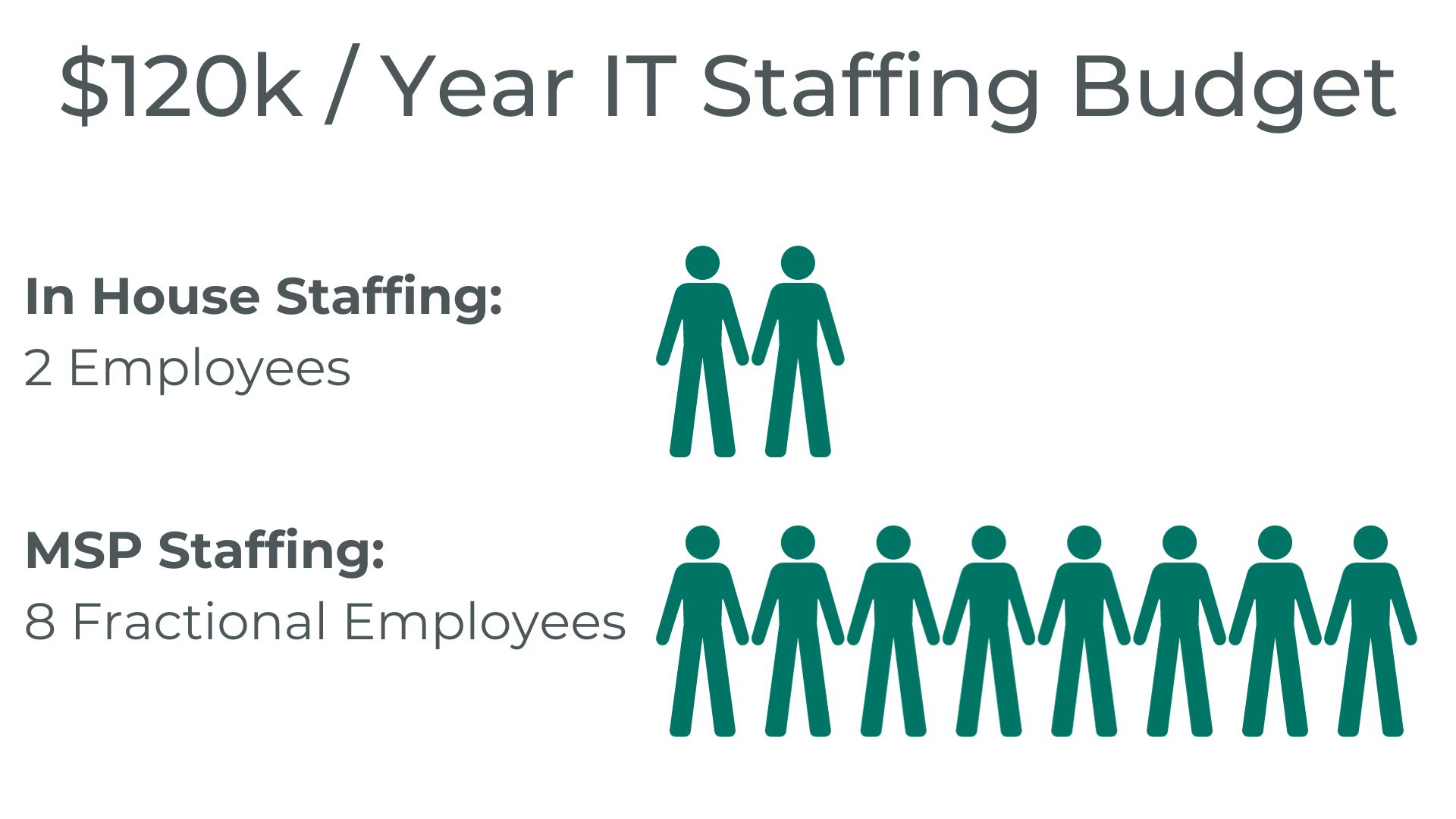How Can MSP's Help Benefit Your Businesses Growth
15 Jul, 20247 minutesRapid technological advancements have significantly enhanced productivity and collaboration ...

Rapid technological advancements have significantly enhanced productivity and collaboration in business.
However, staying abreast of these changes can be a daunting and time-consuming task. As a business owner or executive, determining the optimal approach for managing your IT operations—whether to outsource or handle them in-house—poses a continual challenge.
The inevitability of the changing IT infrastructure space, security demands, and operational requirements necessitates strategic decision-making. Recognizing when to pivot and adapt to these changes is an important responsibility for leadership. Engaging the services of a Managed Services Provider (MSP) offers a practical solution to these challenges. By doing so, you can effectively control costs, enhance efficiency and competitiveness, and achieve scalability for your business. A qualified and reliable MSP brings a host of benefits suitable for organizations of all sizes.
In the upcoming sections of this blog post, we will delve into the various benefits associated with managed IT services and explore the different types available. Additionally, we will discuss best practices that enable businesses to optimize their IT infrastructure and enhance overall efficiency. By the end, you will gain a comprehensive understanding of how managed IT services can significantly benefit your business and learn effective strategies for maximizing the advantages offered by an MSP.
What is a Managed Service Provider (MSP) in information technology?
Managed Service Providers (MSPs) in information technology play a crucial role in transforming the way businesses handle their IT needs. Managed IT services involve the outsourcing of IT support and services to specialized external providers, creating a proactive and efficient approach to monitoring, maintaining, and managing an organization's technology infrastructure. This strategic outsourcing empowers businesses to focus on their core operations while entrusting their IT requirements to a dedicated team of experts.
The trend of outsourcing IT support and cybersecurity has gained significant traction in recent years, driven by the diverse range of services and skills offered by Managed Service Providers in comparison to in-house IT teams.
Key Functions of a Managed IT Service Provider
Managed IT services offer businesses a comprehensive solution to outsource their IT requirements to a third-party provider. In the landscape of 2024, where IT is an integral part of business operations, managing and maintaining a company's IT infrastructure presents challenges in terms of complexity, time consumption, and costs. MSPs step in to address these challenges, delivering expert IT support and services while efficiently managing IT systems.
How Managed Service Providers (MSPs) Drive Cost Savings in IT
Within the expansive realm of Information Technology, a multitude of specialized tasks demand attention. From safeguarding against cyber threats to constructing, implementing, and maintaining infrastructure, and further supporting users in their day-to-day operations, the complexities are vast.
Maintaining an effective IT team becomes challenging given the intricate nature of the work. The standard ratio of IT staff to overall employees often stands at 1:200. Even in the case of a 1,000-employee company, this translates to a modest IT team of 6 or 7 individuals. Acquiring the diverse skill set required for efficient IT management becomes an uphill task with such limited personnel. Attempting to cover all aspects comprehensively with a team of merely 1 or 2 IT staff members is virtually impossible.

Managed Service Providers (MSPs) emerge as a solution by offering fractional expertise. Whether you need an architect for a few hours each month or various specialists handling service desk (helpdesk), IT system administrators, network administrators, device management, application patching, backup, and disaster recovery management, MSPs provide a team of skilled professionals. Essentially, MSPs enable businesses to access the benefits of a large-scale IT department without incurring the substantial costs associated with maintaining an extensive in-house team.
The US market for IT managed services exceeded 60 billion dollars in 2021 and is projected to experience a robust annual growth rate of 12.5% throughout this decade. This signifies a growing recognition among businesses of the value MSPs bring in terms of efficiency, expertise, and, significantly, cost-effectiveness. As organizations seek to optimize their IT operations, the role of MSPs in driving down costs while enhancing overall IT capabilities is poised to become increasingly pivotal.
Benefits Of Outsourcing To A Managed Service Provider
Utilizing a Managed Service Provider (MSP) for your business can yield a multitude of benefits, contributing to increased efficiency, cost-effectiveness, and overall success. Here are some key advantages:
Expertise Access
- Diverse Skill Sets: MSPs offer access to a team of specialists with a broad range of skills, from cybersecurity to network administration. This ensures that your IT infrastructure is managed by professionals with up-to-date knowledge and expertise.
Cost Savings
• Predictable Costs: MSPs often operate on a subscription-based model, providing predictable monthly costs. This allows for better budgeting and eliminates unexpected expenses associated with managing IT in-house.
• Reduced Labor Costs: Outsourcing eliminates the need to hire and train in-house IT staff, saving on recruitment, salaries, and benefits.
Proactive Monitoring and Maintenance
• 24/7 Monitoring: MSPs monitor your IT systems around the clock, identifying and addressing potential issues before they escalate. This proactive approach minimizes downtime and enhances system reliability.
Scalability and Flexibility
• Adaptability: MSPs can scale their services according to your business needs. Whether you're expanding or downsizing, an MSP can easily adjust to accommodate changes in your IT requirements.
• Flexible Solutions: With an MSP, you can choose services a la carte based on your specific needs, ensuring a customized solution that aligns with your business goals.
Enhanced Security:
• Cybersecurity Expertise: MSPs specialize in cybersecurity, implementing robust measures to protect your data and systems from potential threats. This is especially critical in an era of increasing cyberattacks and data breaches.
Focus on Core Business Functions
• Increased Productivity: By outsourcing IT functions, your internal teams can focus on core business activities, innovation, and strategic initiatives rather than getting bogged down by technical issues.
Compliance and Regulation Adherence
• Regulatory Compliance: MSPs stay informed about industry regulations and compliance standards, ensuring that your IT practices align with legal requirements and standards.
Reliable Support and Quick Issue Resolution
• Helpdesk Support: MSPs provide efficient helpdesk support, ensuring that your employees have access to timely assistance for IT-related issues.
• Rapid Issue Resolution: A dedicated MSP responds promptly to IT problems, minimizing disruptions and maintaining a smooth workflow.
Data Backup and Disaster Recovery
• Robust Backup Solutions: MSPs implement secure data backup systems, ensuring the availability of critical data in case of accidental deletion, hardware failure, or other unforeseen events.
• Disaster Recovery Planning: MSPs develop and execute comprehensive disaster recovery plans, minimizing data loss and downtime in the event of a catastrophe.
Competitive Advantage
Technological Innovation: MSPs keep abreast of the latest technological trends and innovations, ensuring that your business remains competitive by leveraging cutting-edge solutions.
Partnering with a Managed Service Provider can empower your business to thrive in a technologically complex environment, providing a range of benefits that extend from cost savings to enhanced security and overall operational efficiency.
Types of Managed IT Services
Managed IT services encompass a broad spectrum of critical functions that businesses can leverage to optimize their technological infrastructure. Here are key categories of managed IT services available for businesses:
Network Management
Network Management involves the oversight and monitoring of a business's network infrastructure. This includes the management of servers, routers, switches, and various other network devices. By entrusting this responsibility to Managed IT service providers, businesses can ensure the reliability and security of their networks, ensuring fast and dependable access to critical data and applications.
Infrastructure Management
Infrastructure Management revolves around the upkeep of a company's hardware and software infrastructure. This encompasses the maintenance of servers, storage systems, and applications. Managed IT service providers play a crucial role in keeping these systems up-to-date, secure, and running efficiently. This proactive management not only reduces downtime but also ensures businesses stay abreast of the latest technological advancements.
Security Management
Cybersecurity is paramount in the realm of IT, and Security Management involves the comprehensive oversight and monitoring of a company's IT security. This includes the management of firewalls, antivirus software, and intrusion detection systems. With the assistance of Managed IT service providers, businesses can identify and address security risks, fortifying their defenses against cyber threats. A Managed IT service provider must be Cyber Essentials accredited, validating their commitment to cybersecurity.
Cloud Management
Cloud Management focuses on the maintenance of a company's cloud-based infrastructure. Managed IT service providers assist businesses in optimizing their utilization of cloud resources, providing access to cost-effective and scalable cloud solutions. This ensures that businesses harness the full potential of cloud technology, enhancing flexibility and efficiency in their operations.
In embracing these managed IT services, businesses can not only streamline their technological operations but also stay resilient in the face of evolving IT challenges. Whether it's optimizing network performance, maintaining infrastructure integrity, fortifying cybersecurity measures, or maximizing cloud capabilities, the expertise offered by Managed IT service providers proves instrumental in navigating the complexities of the modern IT landscape.
Selecting the Ideal Managed IT Services Provider
The success of your business hinges on the careful choice of a managed IT services provider. When evaluating potential candidates, consider the following factors to ensure a strategic and successful partnership:
1. Experience and Expertise:
Look for a managed IT services provider (MSP) with a proven track record of managing IT infrastructures similar to yours, t's essential to go beyond basic maintenance and operation capabilities. Their extensive experience will instill confidence that they possess the requisite expertise to effectively handle your unique IT needs.
Look for a provider equipped with a diverse skill set that encompasses database management, proficiency in multiple network technologies, expertise in cloud-based security technologies, cross-platform integration, and more. A broad range of skills not only ensures effective management, maintenance, and updates to your IT infrastructure but also enables the implementation of strategies to enhance efficiency and fortify security measures.
In addition to evaluating their skill set, inquire about their overall experience. Consider factors such as the duration they have been in business, the collective experience of their staff members, and the industries they have previously served. Collaborating with a managed services provider with a track record in your specific industry can be particularly advantageous. Their familiarity with the challenges and requirements of your sector positions them to deliver tailored solutions that align seamlessly with your business objectives. This industry-specific expertise contributes significantly to the success of your IT partnership and ensures a more targeted and effective approach to managing your technology infrastructure.
2. Comprehensive Service Offering:
Opt for an MSP that provides a comprehensive suite of services, covering network management, infrastructure management, security management, and cloud management. A full-stack service approach ensures that your business can swiftly address any IT challenges that may arise. Additionally, explore software services to bridge the gap between your current capabilities and desired outcomes.
3. Availability:
Managed service providers play a crucial role in overseeing and enhancing your IT infrastructure. They need to maintain consistency and transparency in the modifications made to your system and ensure ongoing communication regarding its health and efficiency. Access to their services should be user-friendly, consolidated in a centralized platform, and available in real time.This ensures that any issues are promptly and efficiently addressed, minimizing downtime and preventing potential long-term damage to your IT infrastructure. Inquire about their availability during holiday periods for further consideration.
Inquire about the accessibility and transparency standards maintained by managed service providers before engaging their services.
4. Security Measures:
Robust security is non-negotiable. Ensure that the managed IT services provider has robust security measures in place to safeguard your IT infrastructure from cyber threats. This includes firewalls, antivirus software, intrusion detection systems, and a commitment to timely software patch updates.
5. Alignment with Your Business Model and Industry Standards
The IT operations of a business encompass various facets, and it is crucial for seamless management aligned with your business model and objectives. It is imperative that the chosen managed services provider comprehends your business model and goals, demonstrating the flexibility to oversee your IT operations in accordance with your unique requirements.
Additionally, confirming adherence to industry best practices by your selected managed services provider is essential. Providers dedicated to these standards not only deliver quality services but also contribute to the continual enhancement of your operations.
6. Cost Considerations:
While cost is a crucial factor, don't let it overshadow other vital considerations. Look for an MSP that offers competitive pricing without compromising the quality of IT support and services. If a managed service provider promises cybersecurity, verify their accreditation to mitigate potential risks.
Are Managed IT Services Worth It?
By diligently assessing these factors, businesses can select a managed IT services provider that aligns with their specific IT needs. A well-chosen provider not only helps enhance IT infrastructure, increase efficiency, and reduce costs but also mitigates the risks associated with cyber threats. The right managed IT services partner becomes a valuable asset in steering your business toward sustained success.
Why work with us?
Although companies have the option to manage the MSP hiring process internally, many choose to engage managed service provider staffing agencies for their expertise and efficiency. Franklin Fitch brings to the table specialized knowledge, access to a broad talent pool, and tools designed to streamline the hiring process. With a deep understanding and experience of the processes involved in MSP talent acquisition, we are adept at ensuring that companies secure the best-fit candidates for each role. By leveraging our services, businesses can optimize their MSP staffing efforts, benefiting from our experience and resources to assemble a high-performing team tailored to their specific needs.
Discover what it means to partner with us by contacting us today to discuss your MSP's hiring and staffing needs.





